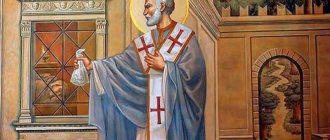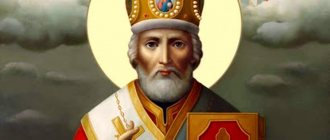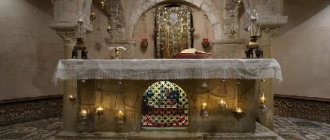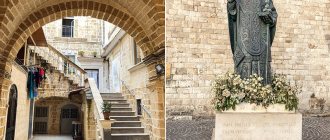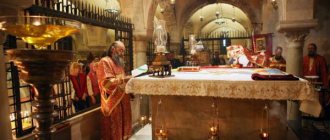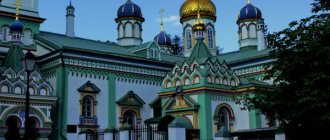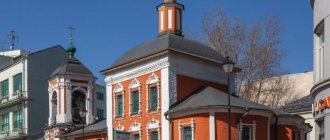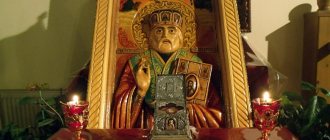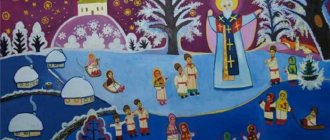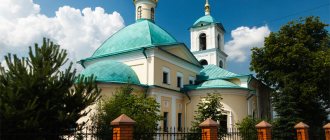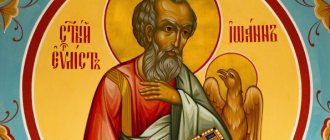In eternal memory there will be a righteous man
Sermon on the day of the transfer of the relics of St. Nicholas from Myra in Lycia to Bar.
In the name of the Father and the Son and the Holy Spirit!
“For eternal memory there will be a righteous person,” says the Holy Scripture. Truly, there are names of God’s saints over whom even time has no power. And as long as our land exists, they will be in the memory of believing humanity.
The Church of Christ knows many saints, but the most revered is Nicholas the Wonderworker of Myra. He is revered and magnified by all the peoples of the earth, even by pagans and Jews and Muslims, for he is a saint of all countries. He is a star that illuminates the entire universe and gives it spiritual joy, as it is said in the akathist. The Holy Church of Christ perpetuated the memory of the Saint by allocating one day in each week - Thursday, dedicated to his memory, as well as several days throughout the year.
Today we remember that sacred event that happened almost a thousand years ago. Saint Nicholas was born in the city of Patras into a pious family and surprised his parents even in childhood, because on Wednesday and Friday he did not accept his mother’s milk. And many other signs were on this baby, and then on the youth. His whole life was devoted to prayer and knowledge of the Lord God.
Saint Nicholas became a presbyter, and when a bishop died in the city of Myra in Lycia, the lot fell on Saint Nicholas to be elected to this great post. The saint refused for a long time out of his humility, but then he had a dream that the Lord was handing him the Gospel, and the Mother of God was placing the bishop’s omophorion on him. And after that he accepted this rank. Saint Nicholas was a good shepherd, he always remembered God and was in a hurry to do good to people.
And today we remember that when 700 years passed after his death, the following happened. He was buried in the city of Myra in a temple, which the Saracens destroyed to the ground along with the city and the entire Lycian region. And only the pious people guarding the tomb managed to build a marble sarcophagus over it. When 700 years had passed since the day of his death, Saint Nicholas appeared to a priest from the city of Bari and told him: “Tell the authorities to take my body from here (from the city of Myra”). A commission was organized, and we went on a search to the city of Myra, where the relics were miraculously discovered. Since the tomb was marble, the Barians could not take it, but when they opened it, they saw that the tomb was filled with a fragrant myrrh. The holy relics were taken into the reliquary and transported for 20 days to the city of Bari. Arrived there on May 9, 1887. The relics of St. Nicholas were greeted with honors by all residents of the city. This event is remembered today by the Holy Church.
What did St. Nicholas deserve such extraordinary veneration? He was an unshakable adamantine of faith and lived by faith. He is revered for his sacrificial love for people, for his compassion, for his mercy, for his intercession before God, for the fact that he did not leave anyone without his prayerful help, who resorted to him with faith and hope. His name translated from Greek means “conqueror of nations.” And he won people’s hearts, but not with pride and lust for power, but with deeds of love, mercy and kindness. He left a memory of himself and love for himself. And the Holy Church glorifies this memory, crying out: “We, who conquer through your love, cry out to you: Rejoice, Nicholas, great Wonderworker!”
His whole life was a sacrificial feat of love for people, he fulfilled the behest of the Apostle Paul and was everything to everyone: a healer to sick people, a comforter to those who grieve, a deliverer to those suffering in disasters, a protector and patron to those suffering from adversity, and a helper in any sorrow.
He did not write theological works, but throughout his life he theologized through his deeds of love for people. He didn't even wait for people to come to him for help. Having the gift of insight, he himself found those in need and helped them both during his life and after his death. It is known that once secretly, under the cover of night, in order to avoid human glory, he threw gold coins to poor girls in order to protect them from shame and save them and their cowardly father, who wanted to sell his daughters as concubines.
When three parishioners from his flock were convicted, Saint Nicholas himself came to the place of execution and snatched the sword from the hands of the executioner (there is a painting of this subject in the Hermitage). And when the other three innocents were convicted and sentenced to death, St. Nicholas appeared with a petition to Emperor Constantine and the sentence was canceled. There are numerous cases when, through his prayers, a storm at sea subsided, which is why he is the patron saint of sailors.
Truly great was the saint! And the Church sings of him, who is the rule of faith, the image of meekness and the teacher of abstinence. Saint Nicholas was like that.
And today’s Gospel with the Sermon on the Mount “Blessed are the poor in spirit...” (Matthew 5:3) - this is all about him, he fulfilled all this. He had humility, patience, and meekness. At the beginning of his bishopric, he was persecuted by the terrible enemy of Christians, Diocletian. He was captured with other Christians and put in prison, and endured hunger, cold, suffering, beatings and the threat of death. But he defeated this persecutor, the Lord kept him for other great deeds and deeds. Constantine Equal to the Apostles freed all Christians, and Saint Nicholas returned to his ministry.
In 325, Constantine convened the First Ecumenical Council to condemn the heresy of the blasphemer Arius. And Saint Nicholas proved the correctness of the true teaching. The lost Arius argued that Christ is not the Son of God at all, but a man, and the Mother of God is the Mother of Christ. This heresy spread so much that it was necessary to convene an Ecumenical Council. There were 318 holy fathers from all churches there, and among them was St. Nicholas. With his jealousy, he denounced Arius and even hit him, for which he was condemned, since the bishop has no right to raise his hand against anyone, for his hands are bound by the “bonds of Christ.” But, having reasoned, the bishops returned St. Nicholas; and the Mother of God herself helped in this, who appeared to them, saying that they must return to this ascetic everything that was given to him from God.
Today we remember St. Nicholas. Almost 17 centuries have passed, but, as it is sung, “there will be a righteous man in eternal memory.” And in our homeland he is called the saint of God, many pious customs are associated with his name, he is the patron saint of sailors and farmers. In many houses of our Fatherland there are icons of St. Nicholas. Both during his life and after his blessed death, Saint Nicholas helped those who turned to him.
Let us always honor the saint of Christ and let us pray that the Lord will give us the strength to imitate his many Christian virtues. Let us pray to St. Nicholas and learn from him to conquer human hearts not with pride and lust for power, but with Christian love and virtue.
Let us pray to the saint that he beseeches the Lord to deliver us from unbearable troubles and misfortunes and grant us and our Fatherland a calm, serene life and grant us a quiet refuge in an ever-blessed life. Amen.
Sermon on the day of remembrance of St. Nicholas the Wonderworker
When twenty years ago we began these religious processions and entered here with the icon of St. Nicholas, then, of course, there was a completely different picture: enormous destruction, paintings were crumbling, in some places brick was visible, and that was crumbling, everything was in scaffolding. Today the Church reverently honors the memory of St. Nicholas the Wonderworker. She calls him “a quick helper, a representative of all and a great intercessor, existing on earth and floating in the sea, a consolation for the sorrowful and a refuge for those in trouble.” Saint Nicholas was born in the city of Patara, Lycian region. Now this area is part of Turkey. He was a Lycian by origin - a representative of an ancient people who inhabited these places since time immemorial. The Lycians had their own alphabet, writing, language and culture, but were later assimilated by the Greeks. It is interesting that the Lycians revered women more than men and traced their family line through the maternal line. The inheritance was passed on to the daughters. Civil rights were also determined by the mother. When in the life of St. Nicholas we read about how he helped marry off three daughters to the end of a ruined father who intended to trade them, we understand that the Saint saved him not only from sin and shame, but also the civil rights of this man’s future grandchildren, so how the children of harlots were considered illegitimate among the Lycians.
The Lycians were a patient and hardy people. The climate of Lycia was capricious, and from June, after the harvest, the Lycians climbed into the mountains to escape the drought. Later, Lycia, having lost its autonomy, became one of the provinces of the ancient Roman Empire, and then became part of Byzantium.
Procession on the waters After one and a half hundred years, in the temple, as under Abbot Damascus, the Divine Liturgy is regularly served and the Inexhaustible Psalter is read. The beginning of summer navigation on Lake Ladoga is blessed with prayer singing for everyone “floating on the waters” and a procession of the cross on Valaam.
Such was the historical and cultural environment of the future Saint Nicholas of Christ, whom the Russian people invariably perceived as their Russian Heavenly patron. The universal veneration of Nicholas the Wonderworker among the Russian people was largely explained by his spiritual qualities, in which our ancestors found many similarities with the Russian folk character. The saint openly, decisively and boldly spoke out in defense of the oppressed and innocent, stood up for those unjustly condemned and persecuted, helped those abandoned by everyone and defenseless. This attitude of the Saint towards people was especially close to the Russian people.
Almost every Orthodox family in Rus' has his icon. The degree of veneration of St. Nicholas by the people can be judged by the fact that the Russian Church held a special service for him on Thursdays and every week along with the apostles. Since ancient times, no saint in Orthodox Rus' has had as many temples and chapels erected to him as St. Nicholas the Wonderworker. “A ready helper for everyone in every need,” as it is sung in the akathist.
The first Russian Christian prince, Prince Askold of Kiev, was baptized in the name of Nicholas the Wonderworker by Holy Patriarch Photius more than a hundred years before the Baptism of Rus'. Over the grave of Askold in Kyiv, Saint Olga, Equal-to-the-Apostles, erected the first church of St. Nicholas in the Russian Church.
The ancient compiler of the life of Nicholas the Wonderworker writes about him: “worked many great and glorious miracles on earth and on the sea, helping those in trouble and saving them from drowning, and from the depths of the sea wearing them dry, delighting them from corruption and bringing them into the house, from bonds and delivering prisons, interceding from the beating of swords and freeing from death, giving much healing to many: seeing to the blind, walking to the lame, hearing to the deaf, speaking to the dumb. He enriched many in the squalor and poverty of the last suffering, gave food to the hungry and was a ready helper for everyone in every need, a warm intercessor and a quick intercessor and defender, and he helped others who called upon him and delivered them from troubles. The message of this great Wonderworker is that the East and West and all the ends of the earth know his miracles.”
You all know his life well and there is no need to give numerous examples of his gracious intercession and help to people.
In Rus' they pray to St. Nicholas for the upbringing of children, for peace in the family, for deliverance from poverty and poverty, for the aversion of lustful thoughts or encroachments, for pilgrims, sailors, travelers, for deliverance from bonds or from death, for the strengthening and purity of the Orthodox faith.
This is especially true today, when the Orthodox faith becomes the object of the politics of people who often call themselves Orthodox, but in reality are as distant from the purity of Orthodoxy as heaven from earth.
I will only note that the life of the Saint continues to be studied and his living appearance does not disappear over the centuries, he is becoming closer to us. There is even a special area of science - Nicholas studies. Not only Russian scientists, but also researchers from all over the world take part in these studies. With the permission of the Vatican, his relics in the tomb were examined. Relatively recently, the real appearance of St. Nicholas the Wonderworker was reconstructed, which turned out to be very similar to his images on ancient icons.
As studies of the relics have shown, the saint was a strict faster - he ate only plant foods, and suffered from diseases characteristic of someone who had been imprisoned for quite a long time in a cramped and damp prison. It is known that the life of St. Nicholas of Myra included part of the life of another saint, also Nicholas, but of Pinar, who also lived in Lycia two centuries later. Russian researchers, with the blessing of Patriarch Alexy II, published a new text of the revised life of St. Nicholas.
It is difficult for me to talk about the holiness and exploits of such a person; every word about him as a shepherd, or about a monk, an ascetic of piety, or simply as a Christian, exposes my unworthiness and every relaxed Christian. As it is sung: “Silence is more convenient than talking about the holy.” But still, no matter how ashamed we are, we must look at the faith and life of the Saint, reflect and talk about it. So that at least we have a feeling of repentance, if we are not able to imitate him in his pious life.
Brothers of the Skete of St. Nicholas the Wonderworker
This is such sacrifice, such incomparable obedience... Now it happens that they say to me: “Father, I’m tired!” And some young people show their impatience. They are told: “Okay, okay, go, you don’t need anything.” And here from them, older people, there is never any grumbling. Everything depended on them.
What is the main feature of the appearance of St. Nicholas, his life path? The first thing that catches your eye is his selflessness, renunciation of himself, of his “I” in the name of the commandment of Christ, in the name of love for God and neighbor. It was not the sorrowful circumstances that awaited him for certain actions that were important for the Saint, but to act in the Spirit of Christ. He crucified his “I” on the cross of Christ: just as the Son of man crucified himself to the will of God the Father, so Saint Nicholas crucified his will to the commandments of the Son of God.
And in this self-crucifixion lies the mystery of Christian achievement, the mystery of the cross, which gives rise to that mysterious power of God that is always co-present with the disciples of Christ. This power makes them miracle workers, gives them great boldness and wisdom, and fills them with endless love for their neighbors. Saint Gregory Palamas speaks about this power: “This reveals God’s wisdom and power: to conquer through weakness, to rise through humility, to grow rich through poverty.”
Let us, brothers and sisters, study the lives and way of the cross of the saints of God, reflect on them, compare the path of our lives with their lives. Notice with what trust in God they accepted all life’s hardships and problems, how they patiently endured all their external and internal sorrows, but did not betray the Lord, did not make a deal with passions, even in excusable cases. Truly the word of the Gospel was everything to them! They laid this whole world at the feet of God, at the commandments of Christ.
That is why, on the days of honoring such great saints of God as St. Nicholas the Wonderworker, you and I are rewarded with joy and hope of salvation. His prayers give us divine grace, which pours out on us on such days, and we believe and pray to him: may he not leave us, the weak, without his gracious help to swim in this abyss of the sea of life, and may he help us, the helper of those who walk on the sea , to complete the path of Christian, God-pleasing life that we have begun in the heavenly haven of the Kingdom of Christ.
Amen!
Hegumen Silouan (Tumanov)
In the Name of the Father and the Son and the Holy Spirit, Amen.
Dear fathers, brothers and sisters!
With all my heart I congratulate you on the holiday of memory of the great saint of God, Saint and Wonderworker Nicholas, Archbishop of Myra in Lycia.
We know Saint Nicholas as a zealous man of prayer for us before the throne of God. I think that in the life of every Orthodox Christian there is such a small, or even not a small, miracle that happened in our country through the prayers and intercession of St. Nicholas the Wonderworker. And if it hasn’t happened yet, it will definitely happen. He had great boldness before God, and great power of prayer, which we can only dream of in order to acquire it in our lives.
And so we hear in the Gospel reading, which is set for his memorial day, that special grace is given to those who preach the name of God. To those who preach Christ, to those who serve Him. Those. Each of us, each Christian, has been given special strength and special authority.
But why, then, are we so weak? Why is everything in our lives not nearly as splendid as in the life of St. Nicholas? We remember that it was harder for him than for us. He got involved at a time when the Church of Christ was not yet universally legal. She was still persecuted; there were many all kinds of attacks and bloody persecutions against the Church of Christ. But Saint Nicholas died his own death and preached worthy of Christ God, and helped people.
And today’s Gospel reading helps us get an answer to this question (Luke, VI, 17-23). At the beginning it says: many came to Christ “to listen to Him, and were healed of unclean spirits, and all the people sought to touch Christ, because power came from him and healed everyone.” And so Christ lifts His eyes to His disciples and says, “Blessed are the poor in spirit.” And then comes the text of the Beatitudes.
Today we consider beggars a social category. A beggar is someone who is not rich enough, obviously poor, and cannot live on the same level as, so to speak, the rest of society.
But if we carefully read the text of the Gospel, and also read the fathers who interpreted the Holy Scripture, we will see that here, in the Gospel sermon, what is meant is not poverty in the sense of lack of money, but something else. And further according to the commandments: not those who want to eat ordinary food will be satisfied, and not those who simply cry will be comforted. Here we are talking about the spiritual, not the worldly. “Blessed” is translated into Russian as “happy.” “Happy are the poor in spirit, for theirs will be the kingdom of heaven.” But why are they happy, and why exactly the “poor in spirit”? But because this is a special term that in the Old Testament designates people who thirst for God more than anything else on this earth.
For example, the prophet and psalmist David said about himself: “Those who sit at the gate talk about me, and those who drink wine sing in songs. And I with my prayer to You, Lord; in an acceptable time, O God, according to Your great goodness, hear me in the truth of Your salvation; take me out of the mire, so that I do not sink; May I be delivered from those who hate me and from deep waters; Let the rush of the waters not carry me away, let the abyss not swallow me up, and let the abyss not close its mouth over me. Hear me, O Lord, for Thy mercy is good; according to the multitude of Your compassions, look upon me; Hide not Thy face from Thy servant, for I am grieved; hear me soon; draw near to my soul, deliver it; for the sake of my enemies save me. You know my reproach, my shame and my disgrace: my enemies are all before You” (Psalm 68: 12-19). And he was rich, he was a king, but about himself he said: “I am a beggar.”
This helps us understand that in the Old Testament the person who said about himself “I am a beggar” is a person who thirsts for God. This does not mean that he has no money at all. This means that he recognizes himself as humble in the eyes of God. The hymn of the poor is the entire Psalter that glorifies this spiritual poverty. And remember the song of the Mother of God: “As you look upon the humility of Thy servant,... depose the mighty from the throne and lift up the humble.”
Here we see the understanding that without God we are nothing in this life. We cry not because we are insulted, or offended, or there is little money, or the ruble has fallen. No, we cry because there is not enough God in our lives. Because the years go by, and we have gained so little from God. And there is little or almost no experience of Communion with God; it all comes down only to prayer, which we humbly read and ask God to “help.” And we hunger and thirst to be satisfied not with an understanding of how to find God in this life, how to live this life with dignity, and not according to the evil models of this age. This is a hunger for eternal life, this is a cry for the Kingdom of Heaven.
And therefore, the Evangelist, realizing that not everyone will understand him, does not just write “blessed are the poor,” but adds “blessed are the poor in spirit,” i.e. emphasizes that we are not talking about the poor, but about you and me, about those who continue the Church of the Righteous of the Old Testament, about those who today continue the great sacred history that has been going on since the first days of the existence of this world. The story of people who first of all thirst for God, and seek God, and only then everything that is necessary for life, survival, feeding themselves and their family.
Are we ready to say about ourselves that we are such poor people? Are we ready to say that we also thirst for God, as the saint and wonderworker Nicholas thirsted for him, whose life we all remember and know perfectly well? I'm afraid that not everyone can say so boldly about their life.
But this does not mean that this opportunity itself is closed to us. By the grace of God, by our humility, the Lord can give us all this and develop our small sparks of piety and prayer into the flame that St. Nicholas had.
Therefore, dear brothers and sisters, let us now pray to the Lord God. Let us pray to St. Nicholas, who is praying for us before the throne of God, that the Lord will grant us the same mercy, the same grace, the same zeal for God. And so that through the communion of the Holy Mysteries of Christ this power will enter our lives. And we will try to be at least somewhat worthy of it.
Amen.
***
Save, Lord, and have mercy on Your servant, the laboring Galina!
Share:
Optina Pustyn
In the name of the Father and the Son and the Holy Spirit.
Who among us has not heard about the miracles of St. Nicholas the Wonderworker, about how he saved the three daughters of a desperate man by tossing him one by one bundles of gold, while remaining unrecognized. Who has not heard about how he saved nobles from the royal wrath, or a ship from sinking in the depths of the sea, a city from famine, or about the circumstances of his election to the episcopal see. When the Metropolitan of the Lycian region died and the bishops gathered, one person had a vision, and the Lord told him to appear early in the morning at the temple. And the first one to enter the temple will be God’s chosen one, whom the Lord wants to be installed as a metropolitan. And so it happened.
Saint Nicholas is known for many miracles. And what can be added to his glory, to his virtues, to his humility, love and mercy, meekness, abstinence. However, there is a thing that is often in front of our eyes, which we take for granted, and at the same time it often disappears from our vision. Just as there is a blind spot in the human eye, the eye is designed in such a way that there are no light receptors in it at certain points, so in our spiritual vision there are blind spots that do not allow us to see quite obvious things. Or more precisely, we see them, but due to their obviousness, we stop appreciating and paying attention to them.
Fresco of the right side chapel of the Vvedensky Cathedral of Optina Hermitage, consecrated in honor of St. Nicholas
To understand what we are talking about and how it is connected with St. Nicholas the Wonderworker, let us give an example from our recent history, from the life of a saint of the Russian Church, probably no less great than St. Nicholas the Wonderworker, the holy righteous John of Kronstadt. When the future Metropolitan Veniamin Fedchenkov, seeing his prayerfulness, his ardent faith, asked him: How did you, father, acquire such ardent faith? Then, after thinking for a moment, Saint John replied: but I lived in the church. What does it mean to live in church, asked the monk, the future metropolitan. With some bewilderment, Saint John of Kronstadt answered: I served the Liturgy, I read the canons, I loved to read the stichera from the Menaion, I lived the church life.
And no one will think that it is possible to succeed and acquire spiritual gifts through personal virtues, through some personal feat. We often read the lives of various saints. As a rule, they always focus on the personal feat of the saint, on his humility, on his abstinence, on some of his exploits, on some miraculous incidents from his life. Many authors, who themselves often do not know about the life of the saint in childhood, write very standard things about how from childhood he avoided games, fuss, and fun with his peers, that he was diligent in prayer, and was thoughtful. The author, often knowing nothing about the saint's childhood, thereby shows his understanding of how he acquired such spiritual gifts. In his understanding, a person should be distinguished by such qualities from childhood. Therefore, most lives talk about certain miracles, about certain omens that supposedly happened in the life of this or that saint, thereby expressing that his understanding of this holiness lies all or mostly in this personal feat of this saint.
In fact, all the gifts of the Holy Spirit, everything that a person receives, he receives in the church. A person may be no different in childhood from his peers, be just as inquisitive, just as cheerful. But church life, purifying it, uniting it with itself, uniting it with the Holy Spirit, who lives in the Church, distributes gifts according to the Apostle Paul, for the Spirit gives to everyone according to his need. He appoints some as preachers, teaches others to rule, appoints others as confessors, and so on, giving each one what he needs (see 1 Cor. 12:7-11). And only in the Church can a person become part of this single divine-human organism. Or as the Apostle Paul said, the Church is the body of Christ, and we are all members (v. 27). But a member cannot receive this life-giving power of grace while remaining cut off from the church body. And therefore, every saint, growing in his spiritual path, in his growth, he always first of all remained a child of the Church. And all the gifts that he received, everything that was in him, even his love for heroic deeds, even his abstinence or desire for hermit monasticism, are always church gifts. This is not some kind of personal decision of his, not some kind of personal desire that awakened in him from nowhere from early childhood.
This is precisely the gift that the Lord gives to man. Then a person begins to be jealous, a person begins to undertake some kind of feat - whether it is a confessional feat, martyrdom, or just some kind of church service. But a person can always acquire something for his salvation only by being in the church body. But this stay in the church body should not be formal. A person cannot be a truly church person if he simply goes to church, simply participates in the sacraments, but does not participate, is not interested in church life, or in some cases even disdains, condemns the hierarchy, condemns the hierarchy, condemns the priests. Even the thought that yes, now priests are not the same as before, now they are completely different, immersed in the worldly, carnal, is enough. Such a thought is enough to cut oneself off a little from the church body. And if you come up to receive communion, and you yourself think that, as in the well-known Orthodox parable, a leper gives you some kind of communion, and you yourself do not respect this person or think that the hierarchy is sinning in some way, then with these thoughts you You are already cutting yourself off from the church body, the head of which is Christ, in whom the Holy Spirit dwells. A person cannot receive grace if he is not in unanimity, in unanimity with the entire Church, if he is not unanimous with its saints, and even in the real historical Church, not fictitious, which once existed, which now exists, in which the Saint now lives Spirit.
Therefore, let us remember that St. Nicholas the Wonderworker did not himself acquire it through some incomprehensible feat of his, some kind of special prayerfulness, some kind of love for God or faith that arose out of nowhere, and in childhood itself. No, he was a church man. He was a man who loved and was devoted to the Church, who followed its rules, and did not condemn anyone. And maintaining this unity with the entire Church, he was that church member who was washed by the grace of the Holy Spirit in this Church.
Therefore, I wish this for you. I wish to always remember that the Church now exists, its historical existence in the form in which you and I live. Let us not delusionally think that we are in unity with the saints who lived then, but now everything is different. No, now the Holy Spirit dwells in the Church, and there is a hierarchy through the priesthood, through the bishops it provides everything necessary for salvation. Let's remember this. Be in church to receive communion, participate in the sacraments, never forget and never judge.
God bless everyone.
Amen.
Hieromonk Dimitri (Volkov)
December 19, 2022
Russian spiritual mission in Jerusalem
Today we, dear brothers and sisters, have gathered to honor the memory of the great saint and saint of God Nicholas, our reliable helper and intercessor.
And on this day, in his holy memory, we always read the Gospel about how the Lord heals the sick, casts out demons and preaches the Kingdom of God. “All the people sought to touch Him, because power came from Him and healed everyone” (Luke 6:19).
The Lord does not refuse anyone, but He came not in order to improve our physical or mental health, but in order to make people qualitatively new, spiritual, to show them the path to bliss. Not just to give water to drink, but to open in every heart an inexhaustible source of grace; not to correct bodily lameness, but to give eternal life to every soul. Blessing the soul and body, He reveals to them spiritual wisdom: “Blessed are the poor in spirit, for yours is the Kingdom of God. Blessed are you who hunger now, for you will be satisfied; blessed are you who weep now, for you will laugh” (Luke 6:20-21).
By filling our bodily needs and shortcomings, the Lord calls us not to be content with earthly things, but to seek heavenly things, not to try to get more comfortable in this life, but to seek the coming eternal Kingdom of truth and love.
So Saint Nicholas, who unfailingly fulfills even the most mundane, everyday requests, calls us to rise above human needs and seek something greater, the very Source of blessings. Not only to enjoy the gifts of his love, but also to imitate his holy life, his blessed service to God and neighbor. Because everything that he has and gives away, he received from the Lord for zeal in piety and zeal in virtue. In the Holy Spirit he sees all our needs and requests, and draws strength from God, rushing to the aid of the suffering and perishing.
And if we do not partake of the grace of the Holy Spirit, if we do not accept light and life from Christ Himself, we will remain gloomy, weak, requiring constant help from the outside, driven by inevitable death and all kinds of fears.
Today we celebrate the memory of another great saint - the prophet of God Isaiah, who is called the Old Testament evangelist for his many prophecies about Christ. In one place he says that humanity will suffer disasters “until the Spirit from on high is poured out on us, and the desert becomes a garden, and the garden is considered a forest” (Isa. 32:15). Desert – poor in spirit, i.e. those who seek the Lord will become a garden, and the self-satisfied, jaded Jews, who call themselves the garden of God, will turn into a wild, dense forest, doomed to be cut down, as the Lord says: “Every garden that My heavenly Father did not plant will be uprooted” (Matthew 15). , 13).
To receive the grace of the Holy Spirit, we must strive for it, thirst and ask for justification and sanctification from God. The Spirit of God will not come into a heart filled with passions and satiated with earthly pleasures. “For I will pour water on the thirsty and streams on the dry,” says St. Isaiah from the presence of the Lord to the patriarch Jacob, “I will pour out My Spirit on your descendants and My blessing on your descendants.” And they will grow among the grass, like willows by streams of water” (Isa. 44: 3-4).
Indeed, the righteous among other people are like willows among grass. They long for grace, for justification in God, and grow toward heaven, gradually becoming great. But the grass, although it is located near a source of water, does not grow, it does not thirst for water, does not hold much of it and therefore remains small, does not rise high from the ground.
And all the saints, working miracles, helping and healing, lead us to the true Helper and Doctor - Christ, to the only important miracle, the miracle of union with God. Comforting us, they call to seek the Divine Comforter, the Spirit of Truth, Who will come and guide us into all truth.
So, let us ask St. Nicholas and other saints for help and intercession in this earthly life, but at the same time let us not forget about the main thing, that we ourselves are called to become bearers of grace. Imitating the saints in our lives, let us follow them to the Source of their strength and miracles - Christ, asking Him to send us the Comforter Spirit, so that the Father, Son and Holy Spirit may dwell in the abodes of our hearts, filling them with eternal life and joy. Amen.
Hegumen Leonty (Kozlov)
Website of the parish church in honor of St. John the Merciful
In the name of the Father, and the Son, and the Holy Spirit!
“For eternal memory there will be the righteous!”
With these and many other words, the Holy Church now glorifies St. Nicholas the Wonderworker. The saint lived in a time far from us and in a country far from us, but his memory passes from generation to generation, from century to century, from generation to generation, because he is a great saint of God, who became famous for his feat, his service, his faithful by being in the Lord, by his sincere feeling of love, which he extended to the people around him. The memory of St. Nicholas is celebrated twice a year, and, in addition, every Thursday the Holy Church remembers the exploits and labors of St. Nicholas, because he deserved to be glorified, to be addressed with fervent prayer, expecting heavenly help through his intercession.
More than 16 centuries ago Saint Nicholas lived. He was born back in the 3rd century and lived at the end of the 3rd century and the first half of the 4th century. The Holy Church glorifies it as a rule of faith. Confessing the faith of Christ at the time when Saint Nicholas lived was very difficult and even dangerous, because the saint lived at a time when cruel persecution of Christians was still ongoing. He was born in the city of Patara, where his uncle, also named Nicholas, served, and under his leadership Saint Nicholas was brought up in the Christian faith and piety, so he was strong in faith, a fearless and courageous confessor of the faith of Christ, despite the fact that there were severe persecution. These persecutions threatened not only various kinds of torment and torment, but also martyrdom. But Saint Nicholas, being firm in his faith and brought up in the Christian spirit, courageously resisted all the machinations of the persecutors. He was imprisoned for many years, but even there he courageously confessed the faith, strengthening others, because many Christians were then thrown into prison for confessing the faith of Christ.
At the time when his uncle, Bishop Nicholas of Patara, went to Jerusalem to worship the holy places, Saint Nicholas, being a presbyter, helped the flock of Patara, led this flock, instructed and strengthened them in the true faith. It is also known from the life of the holy saint of God that not only during persecution did he firmly confess his faith and courageously stand in the face of the tormentors, without hesitating at all, on the contrary, he confirmed others in the faith. But after the Church was established under Emperor Constantine the Great and the Christian faith became permissible, new dangers appeared for the faith of Christ, false teaching appeared on the part of heretics who taught incorrectly about the Son of God. Therefore, Saint Nicholas courageously defended the true faith against false teachers. It is known that he was at the First Ecumenical Council and, together with the other fathers of this Council, opposed the followers of that heresy that incorrectly taught about the Second Person of the Most Holy Trinity, i.e., about Christ, the Son of God, Who came to accomplish the work of salvation the entire human race. This incorrect teaching entailed an incorrect understanding of what the Lord had done, and hence an incorrect understanding of what is required of believers in Christ in order to perceive the redemptive merits of the Lord and how to accomplish the work of their salvation.
Thus, we see that the Holy Church, glorifying St. Nicholas as a rule of faith, has in mind all those events that are connected, on the one hand, with the persecution of Christians, when it was necessary to courageously confess the faith of Christ, and with the time when it was necessary to resist heretical errors that subvert the Orthodox teaching about Christ, the Son of God.
The Holy Church also calls Saint Nicholas the image of meekness. Meekness is a special virtue. The Holy Church glorifies St. Nicholas for this virtue, because he, indeed, showed kindness towards the people around him, despite the fact that he was subjected to all kinds of torture. He was not angry, remembering that the Lord on the cross prayed for his crucifiers, saying: “Lord forgive them, for they do not know what they are doing.” Thus, imitating the meekness of the Lord, he treated those who persecuted Christians and who personally subjected him to torment, torment and all kinds of trials. The Lord also pleases this spirit of meekness in the commandments: “Blessed are the meek, for they will inherit the earth.” And this promise of the Lord was fulfilled on St. Nicholas, because what St. Nicholas inherited is, of course, not some earthly space, but that memory in all corners of the earth that is kept about St. Nicholas, about his life, about his activity, about his zealous service to the Lord, and thus he truly fulfilled what the Lord says: “Blessed are the meek, for they will inherit the earth.” The inheritance of the earth is a memory in all corners of the universe, which through centuries, through space has reached us, and we have such a joyful opportunity to glorify St. Nicholas and turn to him in our prayers not only on the days of celebrating his memory, but always, during all circumstances of life.
The grateful memory of St. Nicholas is manifested in the fact that throughout the vast expanses of Great Rus' many churches were built in honor of St. Nicholas. Saint Nicholas is glorified especially in those places where churches are built in his honor, where a bloodless sacrifice is offered, where prayers and other prayers are constantly performed, glorifying the saint and testifying that the prayer of Christians addressed to him is always fulfilled.
Saint Nicholas is also glorified as an abstinent teacher. Abstinence is also a special Christian virtue. It manifests itself in many circumstances of our daily life, but, unfortunately, we do not always pay attention to it. It consists of unconditional abstinence from all vices and passions. But there is also conditional abstinence, which consists of moderation: moderate food consumption, moderate consumption of everything that is necessary for our daily life. This moderation was the hallmark of St. Nicholas. He didn't want much for himself. He was content with the least. If they brought any donations to the church, then St. Nicholas used it to help the weak, needy, and distressed people. His mercy is known, which manifested itself in saving girls from shame. Being himself full of moral purity and chastity, he very wisely used the means that were at his disposal to save the honor of innocent girls. And, of course, our ancestors, when they glorified St. Nicholas for his abstinence, they had in mind both moral purity and chastity, when they said that “we must take care of honor from a young age,” meaning precisely this moral purity, chastity, which testifies about the integrity of the human personality, which does not waste itself on all sorts of dubious pleasures of the flesh, because it is only in this way, keeping oneself in moral purity, that one can fulfill the commandments of the Lord. After all, the Lord respects the “pure in heart” because they “will see the Lord,” and this, indeed, is acquired only through the moral purity of a person and the desire to, having freed himself from vices and passions, completely devote himself to the acquisition of virtues.
Here, in brief, dear brothers and sisters, is what is contained in the troparion that is sung on this day: “The rule of faith, and the image of meekness, self-control, as a teacher, show you to your flock, even the things of Truth.” And the “Truth of things” is the Lord Himself. He revealed Saint Nicholas as such a saint, who is glorified by the Lord Himself, who is also glorified by us, to whom we turn with prayers.
Saint Nicholas is revered not only among Orthodox Christians, but also among other Christians, especially since the relics of Saint Nicholas reside in the city of Bar. This is a Catholic church, in which the relics of St. Nicholas are located, but all Christians can pray there, many of whom, thanks to the Lord, can now visit this holy place.
Saint Nicholas is the patron saint of sailors and travelers. Many of those who, due to their duty of service, are at the mercy of the sea elements, always turn to St. Nicholas, and sailors always revere him, because he truly shows miracles of mercy and saves very many, namely those with a broken heart, truly strives to find heavenly help through the prayers of this great saint of God. Let us, dear brothers and sisters, now glorifying the saint and wonderworker Nicholas, always turn to him with our prayers, and the Lord, by His mercy, through the prayers of the saint, will honor us with unspeakable blessings.
Amen.
Archpriest Vasily Stoykov
December 19, 2013
Share:
leave a comment
Orthodox Life
About our petitions and the conditions for their implementation.
On December 19, we honor the memory of St. Nicholas - a holiday that, not in its meaning or semantic content, but in the solemnity and attitude of people towards it, can be compared with the Twelve. The Miracle Worker of Myra was and remains one of the great saints of God and an intercessor for all who turn to him.
About such lights as saints. Nikolay, it’s always difficult to write or speak. His life feat, a huge number of examples of help even after death are in themselves a great sermon of Christ. Compared to him, my attempts look like a pathetic attempt at imitation. The saint really always remained faithful and incredible love for God, he really helped and helps people, and all I can do is practice with the keyboard. But I really want to hope that this article will become my small contribution to the further glorification of the great saint, and then how it goes.
Well, it is written and said about the saints. Nikolai has plenty, so I’ll only share the sketch of thoughts that formed literally ten minutes before my fingers hit the keyboard. It was not for nothing that I mentioned the fact that Nicholas the Wonderworker does not leave us in his intercession even after death. This idea seems to be understandable, because it is obvious that there is no saint, glorified by the Church or forgotten, who would not pray for the human race and for the salvation of each individual soul. However, from St. Nikolai, apparently, somehow everything is a little different. Perhaps this is not a secret for some, but at one time, when I was already a priest, I saw an icon of the saint. Nicholas, along the perimeter of which scenes of miracles he performed already in the twentieth century were depicted. At first I didn’t understand why there were cars, airplanes, high-rise building construction and other unusual images on the icon. But then everything became clear, it turns out that there is a hefty list of evidence of the help of the saints. Nicholas actually to our contemporaries, exceeding even the volume of his own life. After re-reading a number of them, I realized that the saint often helps when there is no other hope left. At such moments, a person always discards any mercenary, consumer attitude towards prayer, realizes the limitations of his strength and completely surrenders himself to God’s will and the intercession of the saint.
Here, for example, is a certain Maria Petrovna, who came to visit her sister in the village of Luzhki. No one met her at the train station, and she had to walk through the forest where there were wolves. Anyone who knows even a little about the habits of these animals understands how smart and cruel they are. The sun was already setting, the forest had grown dark, and Maria Petrovna could not find the way to the village. Realizing the danger that was threatening, she prayed: “Saint Nicholas, look what happened to me, help me, dear, because the wolves on the road will gnaw me to pieces,” - hearing the sound of a cart driven by an old man, and running towards the sound, our heroine found a way out . This small story combined both a truly terrible situation and such a warm and tender attitude towards the saint.
We sometimes ask for a lot and ask a lot for something, from God or from the saints, but in reality, not all requests are fulfilled. And it's good that it is so. God is not a service bureau or a magician. We understand well, either from personal experience or on a rational level, that everything we ask for is not always useful and saving for us. But on the other hand, any fulfillment of the request would destroy faith, just as the pursuit of miracles destroys faith. A miracle, in its highest expression, is a personal action of God, an action in which there is no room for human effort. A person can only stand aside and watch. This is exactly what happened to Maria Petrovna. In her situation, she could no longer hope for any earthly help. There were no other people with her, she had no weapons, but only fervent prayer to the saint. So the Lord sent her grandfather on a cart, whom no one else noticed. Let this story also become an example of the conditions for fulfilling our petitions. “If you ask for seed for your field, then first fertilize the field to receive the seed,” St. Dorotheus of Palestine.
A similar, but more difficult situation occurred in 1999 in St. Petersburg. Mom Yulia decided to give her sick son a piece of cottage cheese on the tip of a spoon for the first time. Unexpectedly, this minor action provoked anaphylactic shock, the child began to quickly swell and suffocate. The father of the already half-dead baby was taken to the hospital; initially, the doctors thought that he had choked, and therefore their actions were incorrect. At this time, my mother prayed to God, and the saint. She gave her word to Nicholas to light a candle next to each of his icons in all the churches of the city. Despite the situation, the child survived. It was not very easy for Julia financially, but she kept her promise. It may seem to us that lighting a candle in every church in the city is not very difficult, but this is for us, church people. But for a person who has never really bothered with matters of faith, this is quite a feat.
We see that in the described case the situation was generally stalemate, and the parents of the unfortunate baby were left with only hope. And here again a miracle happened in which man was only an observer. Moreover, mother Yulia makes a promise to fulfill some, albeit small, feat. This is an indication of another condition for the fulfillment of our petitions, which the saint spoke about. John Chrysostom - to do what is due on your part.
The saint conveys to us the thought expressed in a slightly different form. Gregory of Nyssa: “Not everyone who asks can receive what he wants, but he who by works has acquired the right to ask with boldness.” That's how it works! If we want to receive what we ask, we must be filled with Christian virtues, but when we acquire them, we will not ask for anything vain, we will learn to recognize the will of God and ask for only it to be done. “When approaching the Benefactor, be beneficent yourself,” the saint continues. Gregory, - when approaching the Good, be good yourself; approaching the Righteous One, be righteous yourself; when approaching the Patient One, be patient yourself; when approaching the Humane, be humane; and also be everything else, approaching the Kind-hearted, the Benevolent, the Sociable in good things, the Merciful to everyone, and, if anything else divine is seen, becoming like in all this by will, thereby acquiring for yourself the boldness to pray.” In this regard, all modern miracles associated with the name of St. Nicholas, are very revealing - no one would dare to say that he was not kind, patient, beneficent, righteous and philanthropic. It is we who do not correspond to what the saint described. Gregory image, that’s why we need Heavenly intercessors. The Miracle Worker of Myra, as a faithful servant of the Lord, has always been and remains the executor of His will. As an Angel, he appeared to suffering people, and his appearance was a sign of a saving miracle taking place.
Of all the many modern testimonies of the intercession of St. Nicholas, I gave only a couple of cases, but I think this is enough to understand what a great intercessor we honor on December 19. All the described cases give us hope that, if we find ourselves in a difficult situation, St. Nicholas the Wonderworker will not forget us in his decisive prayer. We should not forget that we must constantly learn to pray, acquire boldness before God, and the conditions for the fulfillment of our petitions have already been said.
We hope and trust in the mercy of the Lord and the intercession of the great saint of God - St. Nicholas, the Wonderworker of Myra.
Archpriest Vladimir Dolgikh
